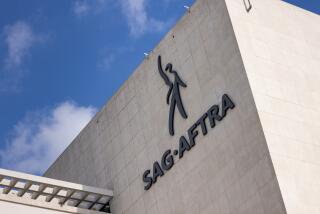Songwriters, Musicians War Over DAT
- Share via
With about a dozen songwriters picketing against digital audio tape (DAT) outside and another dozen boosting DAT recorders inside a West Hollywood recording studio, the music industry opened warfare over the controversial new audio technology at a press conference Wednesday.
“You see outside the nonsense about copyright,” said Paul Avgerinos, one of nine Musicians for DAT who hosted the morning press conference at Westlake Studios on Beverly Boulevard. “We are against piracy and bootleggers too, but let’s focus on them, not on home recording rights.”
Carrying placards that warned against DAT as a vehicle for music pirates to make quick, near-perfect copies of albums and tapes, members of the National Academy of Songwriters demonstrated briefly in front of the recording studios before the press conference got under way. Like the Recording Industry Assn. of America, all six major record labels and several other music industry trade groups, the picketing composers contended that DAT will allow bootleggers to effectively destroy their income from copyright royalties by cutting into legitimate record sales.
“Why would you go buy one (an album, compact disc or tape cassette) when you could make a perfect copy from someone else’s cassette for free on your own DAT recorder?” one picketer asked.
DAT tape decks and cassettes, which have been available to consumers in Japan for nine months, are not yet available in the United States, but they are expected to go on sale here by spring.
A year ago, an RIAA-supported bill was introduced in the Senate which would require all DAT imports to contain a so-called “spoiler” data chip, making it impossible to copy cassettes. The proposed legislation has received wide support from performers and composers, ranging from Leonard Bernstein to Quincy Jones and hundreds of other recognizeable music-industry names.
Stevie Wonder and Joe Jackson are the only high-profile performers who have aligned themselves with pro-DAT groups such as Musicians for DAT and the RIAA’s chief opponent, Home Recording Rights Coalition. The coalition is backed by the Electronics Industry Assn. which supports member companies such as Sony, Panasonic and General Electric in their drive to put DAT recording devices on the U.S. without spoiler chips.
Though Musicians for DAT lists a number of independent record labels, avant-garde musicians and sound engineers among their members, no superstars were listed among their ranks.
“That’s because the superstars represent the backbone of the major record labels who are the RIAA,” said Bob Everhart, Musicians for DAT chief spokesman.
Asked if major recording stars feared reprisal from their labels if they spoke out in favor of DAT, Everhart said:
“Possibly. Isn’t that a logical conclusion?”
In a phone interview, RIAA spokeswoman Tawnya Blackwood denied that the Washington, D.C.-based lobbying organization has applied pressure to artists to speak on behalf of the proposed Senate legislation. She added that there will probably not be any action on the spoiler chip bill until next year.
For the past three months, the National Bureau of Standards has been testing the chip to see how it might affect DAT sound quality. Federal lawmakers have agreed to hold off further hearings or action on the bill until they receive the results.
In the meantime, Avgerinos, Everhart and the 135 other members of Musicians for DAT say that a “gray market” in DAT recorders has already developed with the piecemeal import of DAT recorders from Tokyo to Los Angeles. The recorders, which retail in Japan for $1,200 to $2,000 apiece, are being bought and sold in California on a limited basis, chiefly among professional musicians. Importing the recorders is not illegal at present; DAT imports are expected to increase while Congress ponders the spoiler chip question.
“I’ve been waiting on this to come out since, believe it or not, 1969, when they first started experimenting with it, said Emmy Award-winning sound editor James Christopher, a member of Musicians for DAT. “The sound is nearly perfect. I’ve been waiting with lust in my heart.”
More to Read
The biggest entertainment stories
Get our big stories about Hollywood, film, television, music, arts, culture and more right in your inbox as soon as they publish.
You may occasionally receive promotional content from the Los Angeles Times.










